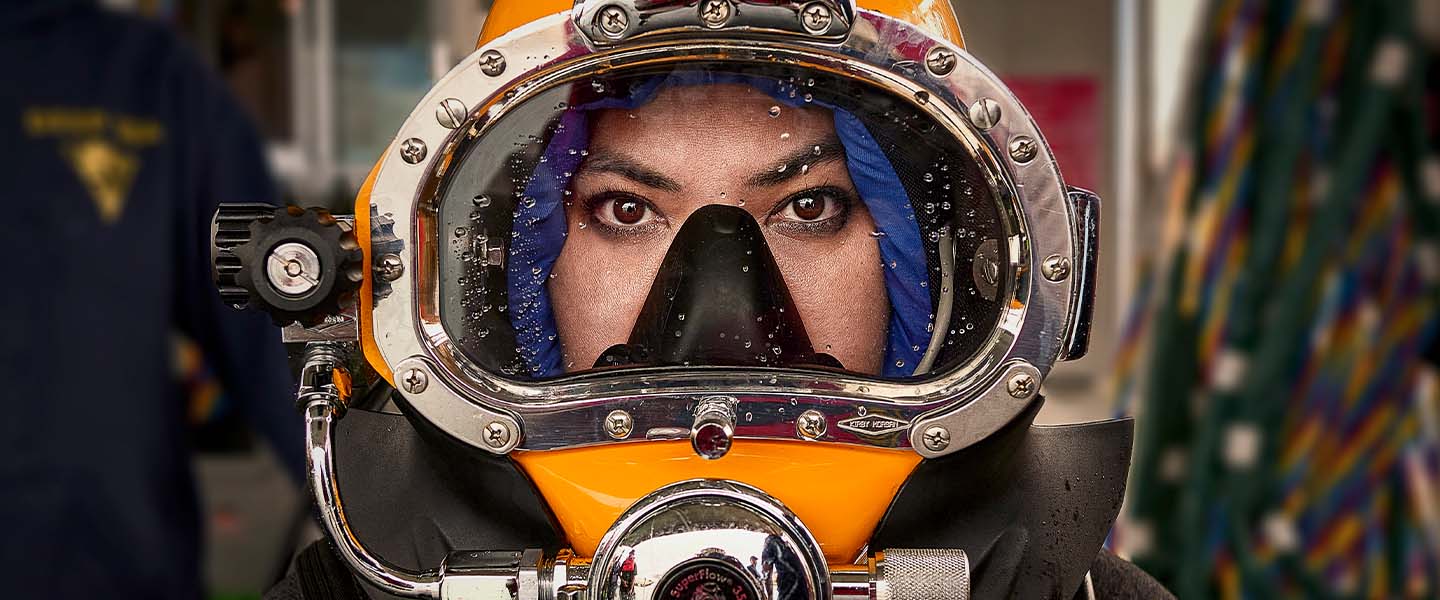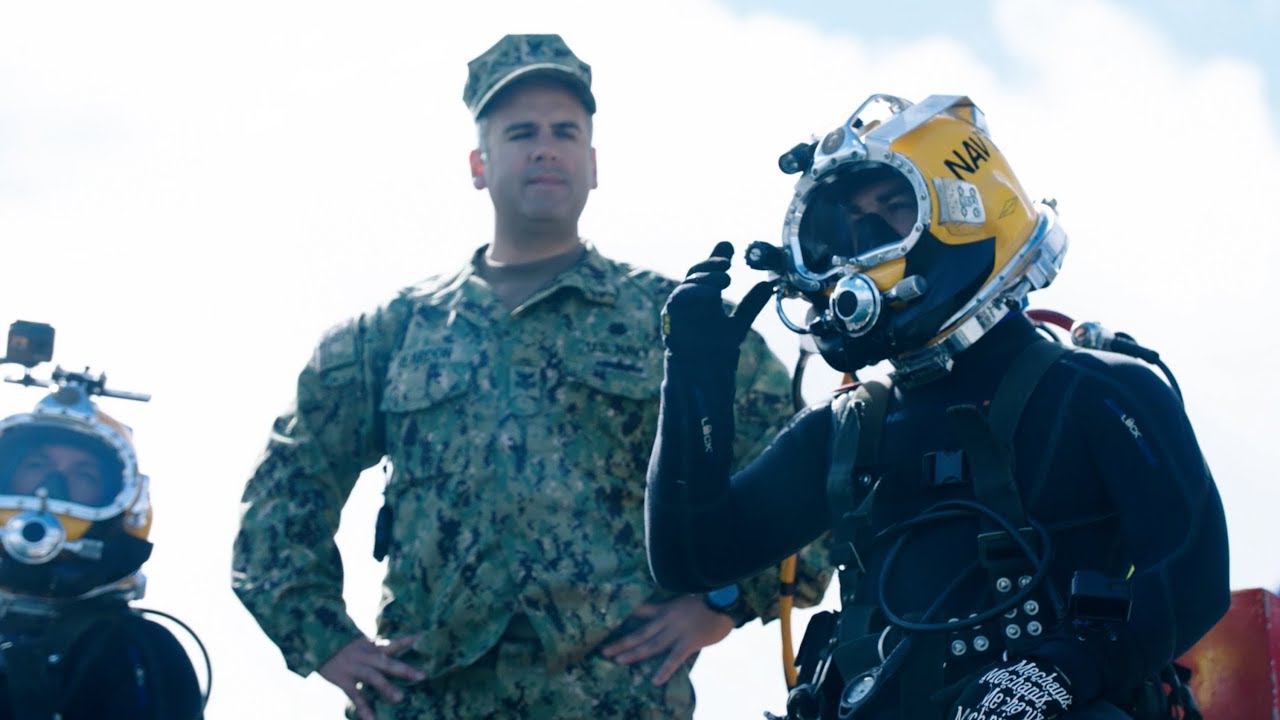WATCH VIDEOS ABOUT NAVY DIVERS
NAVY DIVER: CAREER DETAILS & REQUIREMENTS
Responsibilities
Navy Divers operate anywhere from the shallow waters of coral reefs and harbors around the world to the freezing depths beneath icebergs, accomplishing specialized tasks below the surface, with no margin for error. Your job as a Diver could encompass many specialties, including:
- Performing wreckage salvage operations and underwater repairs
- Conducting harbor and waterway clearance operations
- Assisting in construction and demolition projects
- Executing search and rescue missions
- Performing deep submergence operations and saturation diving, which could involve living and working at extreme depths for days or weeks at a time
- Supporting military and civilian law enforcement agencies
- Serving as technical experts for diving evolutions for numerous military Special Operations units
- Providing security, communications and other logistics during Expeditionary Warfare missions
- Carrying out ship and submarine maintenance, including inspection and repair
Work Environment
Fittingly, the Navy Diver motto is “We Dive the World Over.” Members of this Special Operations force travel the world, working in just about every possible undersea environment—from cold, muddy water where underwater tasks must be completed without the use of sight, to warm, tropical waters clear enough for underwater photography.
Training & Advancement
Training to become a Navy Diver challenges your willpower, intelligence and physical strength—and puts your desire to the test. Complete the training, and you’ll rank among the world’s elite underwater adventurers.
Upon completion of initial training at Recruit Training Command Great Lakes (known as Boot Camp), you’ll report for specialized training, including:
Diver Preparation Course (7 weeks) at Naval Training Command, Great Lakes, IL, for training in basic electrical and engineering courses, water adaptability and physical fitness.
Second Class Dive School (15 weeks) at the Naval Diving and Salvage Training Center (NDSTC) in Panama City, FL, for training in:
- Air and mixed gas diving
- Underwater cutting and welding
- Demolition
- Recompression chamber operations
- Underwater hydraulic tools
- Ship maintenance, repair and salvage
Fleet Training – You will be assigned to one of the Navy Diving Units to be trained to perform underwater ship repair, salvage and construction, using either SCUBA equipment or a surface-supplied-air diving system. Training for Diving Medical Officers and Diving Medical Technicians is also part of Fleet training.
Upon successful completion of training, graduates are assigned to salvage or repair ships, Mobile Diving and Salvage Units, aviation water survival training, or to EOD/SEAL support.
Advanced Training – Many experienced divers return to NDSTC for further course work so they can qualify as First Class Divers and Master Divers. For those with further leadership aspirations and a college degree, Officer roles are available, providing opportunities to lead and train others.
Promotion opportunities are regularly available but competitive and based on performance.
Post-Service Opportunities
It’s also important to note that specialized training received and work experience gained in the course of service can lead to valuable credentialing and occupational opportunities in related fields.
Education Opportunities
Members of the Naval Special Warfare community have many opportunities to advance their education. Navy training provides skills and knowledge in everything from military tactics, deep-sea diving and several other tactical military procedures.
Beyond offering access to professional credentials and certifications, Navy training in this field can translate to credit hours toward a bachelor’s or associate degree through the American Council on Education.
You may also continue your education through undergraduate degree opportunities like the Navy College Program and Tuition Assistance and the Post-9/11 GI Bill.
Qualifications & Requirements
No college degree is required to apply for a position as an Enlisted Navy Diver. However, a high degree of difficulty should be expected. Training is tough and ongoing. You can apply for the Navy Warrior Challenge contract for Divers at any time during your first enlistment. Entry Requirements include:
- Eyesight 20/200 bilateral correctable to 20/25 with no color blindness
- Minimum Armed Services Vocational Aptitude Battery (ASVAB) score: AR+VE=103, MC=51
- Pass a physical examination required for divers
- Meet minimum ASVAB requirements
- Be 30 years of age or younger
- Must be a U.S. citizen and eligible for security clearance
You must be in excellent physical condition and possess strong swimming ability and comfort in the water. The ability to perform detailed tasks in stressful conditions is essential. This job is not a good fit for people who experience claustrophobia.
The Minimum and Elevated Navy Physical Screening Test (PST & EPST) requirements for Navy Diver are:
| Exercise | Time | Min. | Elevated |
| Swim 500 yards (combat sidestroke) | Unlimited | 12:30 | 11:00 |
| Push-up | 2:00 | 50 | 70 |
| Sit-up | 2:00 | 50 | 70 |
| Pull-up | 2:00 | 06 | 10 |
| Run 1.5 miles | Unlimited | 12:00 | 11:00 |
Candidates who achieve the Elevated Physical Screening Test (EPST) scores shown above may qualify for the Enlisted Bonus for Shipping (EB-SHP) program. These elevated standards must be met during your 14-day shipping PST to be eligible for the bonus. Learn more about Navy enlistment bonuses.
General qualifications may vary depending upon whether you’re currently serving, whether you’ve served before or whether you’ve never served before.
Part-Time Opportunities
There are no part-time jobs as a Navy Reserve Sailor in this role. Go back to Careers to find other jobs that have a Reserve component. You can also find out more about what life is like as a Reserve Sailor in the Navy.
CAN YOU OUTPERFORM TOP NAVY DIVER CANDIDATES?
Check the Navy Diver PST leaderboard and find a testing event near you.
WATCH VIDEOS ABOUT NAVY DIVERS
NAVY DIVER: CAREER DETAILS & REQUIREMENTS
Responsibilities
Navy Divers operate anywhere from the shallow waters of coral reefs and harbors around the world to the freezing depths beneath icebergs, accomplishing specialized tasks below the surface, with no margin for error. Your job as a Navy Diving Officer could encompass many dive specialties, including:
- Planning, supervising and directing the activities of enlisted Navy Divers, and assigning and coordinating the activities of all personnel under your command
- Serving as a diving instructor at diving training centers
- Performing wreckage salvage operations and underwater repairs
- Conducting harbor and waterway clearance operations
- Assisting in construction and demolition projects
- Executing search and rescue missions
- Performing deep submergence operations and saturation diving, which could involve living and working at extreme depths for days or weeks at a time
- Supporting military and civilian law enforcement agencies
- Serving as technical experts for diving evolutions for numerous military Special Operations units
- Providing security, communications and other logistics during Expeditionary Warfare missions
- Carrying out ship and submarine maintenance, including inspection and repair
Work Environment
Fittingly, the Navy Diver motto is “We Dive the World Over.” Members of this Special Operations force travel the world, working in just about every possible undersea environment—from cold, muddy water where underwater tasks must be completed without the use of sight, to warm, tropical waters clear enough for underwater photography.
Training & Advancement
Training to become a Navy Dive Officer challenges your willpower, intelligence and physical strength—and puts your desire to the test. Complete the training, and you’ll rank among the world’s elite underwater adventurers.
All Dive Officers must attend a certified Navy Officer training program before dive training begins. Once that training is complete, you will learn the ins and outs of life as a diver. Dive training includes:
Diver Preparation Course (7 weeks) at Naval Training Command, Great Lakes, IL, for training in basic electrical and engineering courses, water adaptability and physical fitness.
Second Class Dive School (15 weeks) at the Naval Diving and Salvage Training Center (NDSTC) in Panama City, FL, for training in:
- Air and mixed gas diving
- Underwater cutting and welding
- Demolition
- Recompression chamber operations
- Underwater hydraulic tools
- Ship maintenance, repair and salvage
Fleet Training – You will be assigned to one of the Navy Diving Units to be trained to perform underwater ship repair, salvage and construction, using either SCUBA equipment or a surface-supplied-air diving system. Training for Diving Medical Officers and Diving Medical Technicians is also part of Fleet training.
Advanced Training – Many experienced divers return to NDSTC for further course work so they can qualify as First Class Divers and Master Divers. For those with further leadership aspirations and a college degree, Officer roles are available – providing opportunities to lead and train others.
Promotion opportunities are regularly available but competitive and based on performance.
Post-Service Opportunities
It’s also important to note that specialized training received and work experience gained in the course of service can lead to valuable credentialing and occupational opportunities in related fields.
Education Opportunities
Beyond professional credentials and certifications, Navy Dive Officers can advance their education by:
- Pursuing opportunities at institutions such as Naval Postgraduate School (NPS) or Navy War College (NWC)
- Completing Joint Professional Military Education (JPME) at one of the various service colleges
Find out more about additional education opportunities for Officers, including post-graduate school now.
Qualifications & Requirements
A degree from a four-year college or university is a minimum educational requirement to become a Commissioned Officer. You must also attend Officer Training. There may be exceptions to the degree requirements based on extensive service experience. Additional qualifications include:
- Eyesight 20/200 bilateral correctable to 20/25 with no color blindness
- Pass a physical examination required for divers
- Be 30 years of age or younger
- Must be a U.S. citizen and eligible for security clearance
The Minimum and Elevated Navy Physical Screening Test (PST & EPST) requirements for Navy Diver are:
| Exercise | Time | Min. | Elevated |
| Swim 500 yards (combat sidestroke) | Unlimited | 12:30 | 11:00 |
| Push-up | 2:00 | 50 | 70 |
| Sit-up | 2:00 | 50 | 70 |
| Pull-up | 2:00 | 06 | 10 |
| Run 1.5 miles | Unlimited | 12:00 | 11:00 |
Candidates who achieve the Elevated Physical Screening Test (EPST) scores shown above may qualify for the Enlisted Bonus for Shipping (EB-SHP) program. These elevated standards must be met during your 14-day shipping PST to be eligible for the bonus. Learn more about Navy enlistment bonuses.
General qualifications may vary depending upon whether you’re currently serving, whether you’ve served before or whether you’ve never served before.
Part-Time Opportunities
There are no part-time jobs as a Navy Reserve Sailor in this role. Go back to Careers to find other jobs that have a Reserve component. You can also find out more about what life is like as a Reserve Sailor in the Navy.
CAN YOU OUTPERFORM TOP NAVY DIVER CANDIDATES?
Check the Navy Diver PST leaderboard and find a testing event near you.

































































































































